Publications
The International Recommendations for Tourism Statistics 2008, which has been released in 2010, provides a comprehensive methodological framework for collection and compilation of tourism statistics in all countries irrespective of the level of development of their statistical systems. The publication also contains a wealth of information that might be of interest to data users who would like to understand better the nature of tourism data. The international recommendations were drafted by the World Tourism Organization in close cooperation with the UN DESA Statistics Division, the International Labour Organization and other members of the Inter-Agency Coordination Group on Tourism…
The Supplement covers a number of topics deemed to be beneficial to trade data compilers, including an overview of compiling practices, the revised International convention on the simplification and harmonization of customs procedures (revised Kyoto Convention), the 2007 edition of the Harmonized Commodity Description and Coding System, specific compilation issues such as goods for processing and re-exports and an overview of the differences between IMTS and general merchandise.
The present report recognizes that further progress has been made towards fulfilling the promises embodied in Millennium Development Goal 8 (MDG 8). At the same time, it identifies important setbacks, most of which have arisen from the current state of the world economy which is suffering its severest downturn since the Great Depression of the 1930s. Some donor countries are cutting their budgets for official development assistance (ODA); several developed and developing countries have resorted to protectionist measures; resurging debt distress is increasing the need for further and broader debt relief; the costs of essential medicines are on the rise; and the technological divide…
The Millennium Development Goals report presents a yearly assessment of global progress towards achieving the MDGs. It is prepared by the Statistics Division at DESA on the basis of input provided by the members of the Inter-agency and Expert Group on MDG Indicators. Less than six years away from the 2015 deadline to achieve the MDGs, this report warns that despite many successes, overall progress has been...
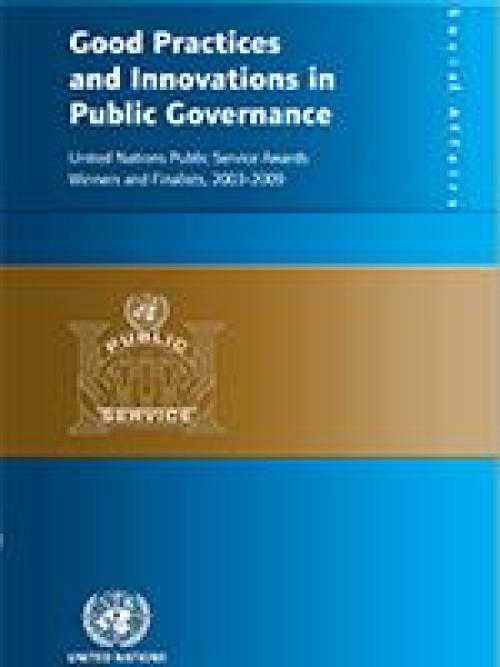
This publication provides an overview of 85 successful innovations in governance and public administration from 40 countries that received the United Nations Public Service Awards, which is the most prestigious international recognition of excellence in public service. The purpose of this book is to disseminate, through descriptive case studies, information about innovative practices by looking at the problem that led to an innovation; the solution that was designed and implemented to respond to the specific challenge; the actors and steps involved in the innovation process, and lessons learned. Learning more about how public institutions from around the world have solved difficult…
This report presents an assessment of progress, based on data available as of June 2008 on all official Millennium Development Goals (MDG) indicators, including the new ones introduced. The aggregate figures in the report provide an overall assessment of regional progress under the eight goals and are a convenient way to track advances over time.
The MDG Gap Task Force has assessed the global commitments contained in the framework of the Millennium Development Goals (MDGs) ratified by Governments as the various international events that followed the Millennium Summit. The United Nations Millennium Declaration emphasized that strengthened global partnerships for development were needed to provide the enabling environment for accelerating progress in reducing poverty, improving health and education, establishing gender equality and ensuring the protection of the environment as defined in the MDGs.
The main message of the present report is that while there has been progress on several counts, important gaps remain in…
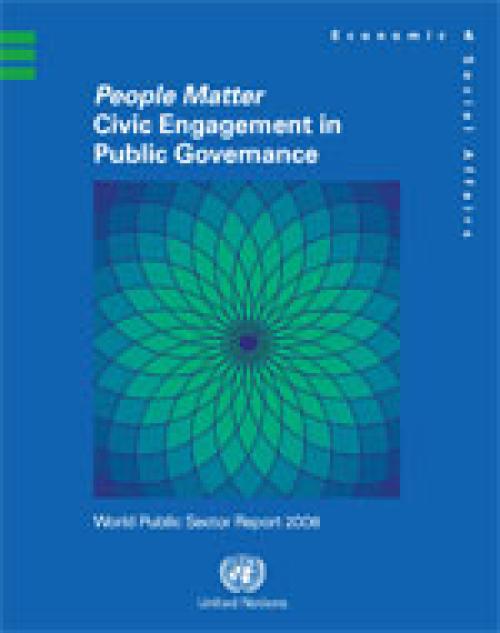
People Matter: Civic Engagement in Public Governance
The 2008 World Public Sector Report, People Matter: Civic Engagement in Public Governance, highlights the importance of civic engagement in public governance and by profiling several case studies, demonstrates how such practices gain the capacity to strengthen governance, make it more transparent and accountable and most importantly, contribute to developmental outcomes that are more sustainable, equitable and just. The Report also highlights several challenges and cautions that adequate attention must be given to the issues of power relations, institutional capacities of the government as well as the civil society organizations…
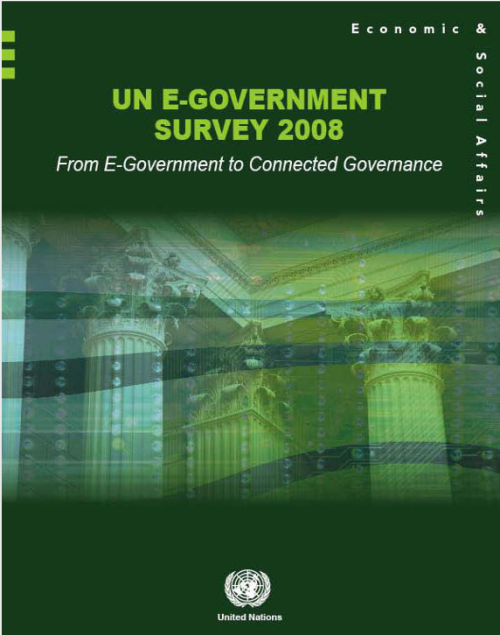
The UN E-Government Survey 2008: From E-Government to Connected Governance assesses the E-Government Development of the 192 Member States of the UN according to a quantitative composite index of e-readiness based on website assessment, telecommunication infrastructure, and human resource endowment. ICTs can help reinvent government in such a way that existing institutional arrangements can be restructured and new innovative arrangements can flourish, paving the way for a transformed government.
The focus of the report this year, in Part II, is e-government initiatives directed at improving operational efficiency through the integration of back-office functions. Whilst such…
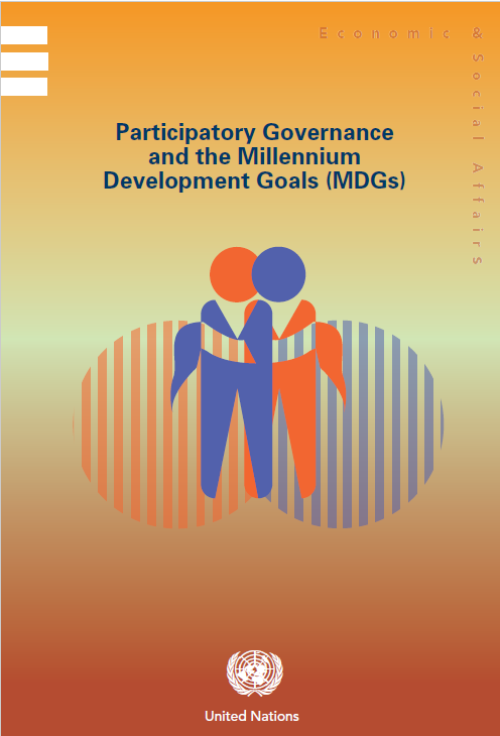
The Participatory Governance and the Millennium Development Goals (MDGs) publication is an output of the Expert Group Meeting (EGM) organized by UNDESA on Engaged Governance: Citizen Participation in the Implementation of the Developmental Goals including the Millennium Development Goals, which was held at the United Nations Secretariat, New York, from 1-2 November 2006.
The EGM convened leading experts on the subject, with the goal of providing a platform for dialogue and exchange of insights and experiences on pertinent issues relating to the role of engaged governance and participation in the implementation of development goals. The meeting covered topics including the pre-…
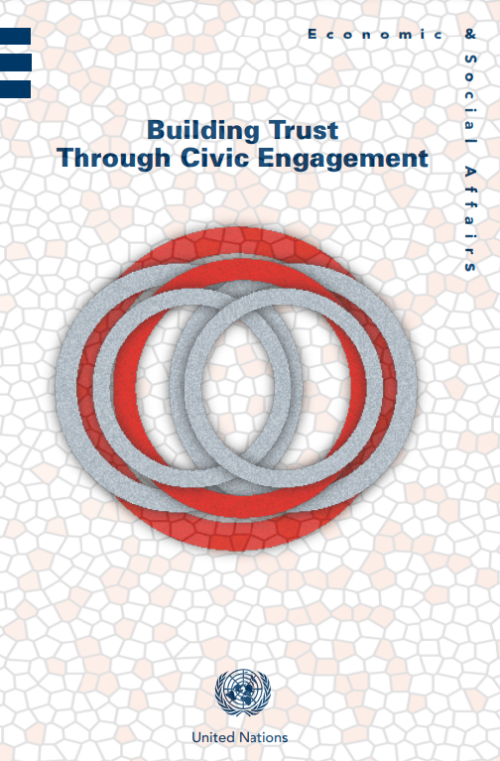
This publication is the result of the Workshop on Building Trust through Civic Engagement, held as part of the 7th Global Forum on Reinventing Government: Building Trust in Government, which took place at the United Nations Headquarters in Vienna from 26 to 29 June 2007. The Workshop was organized by the United Nations Department of Economic and Social Affairs (UNDESA), with the support of partner institutions including the Eastern Regional Organization for Public Administration (EROPA), Kyung Hee University (Republic of Korea), the International Budget Project of Washington, D.C., Queensland (Australia) Community Engagement Alliance, and the New York University Wagner Graduate School of…
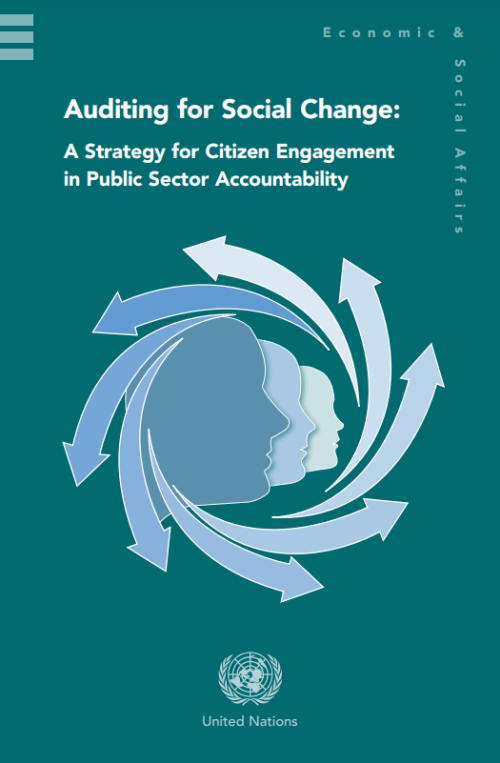
The publication is a result of the outcome of the Expert Group Meeting (EGM) in Seoul on May 26-27 2005 titled “Auditing for Social Change”, organised in partnership with the Board of Audit and Inspection (BAI) of the Republic of Korea, to discuss how the audit function, both external and internal, can become tools for social change and impact.
The EGM drew together experts from research institutes, think tanks, civil society organizations, international organizations as well viii Auditing for Social Change as the external and internal audit community. It explored how the audit process can be made more open and participatory and indeed, how audit can be used as a…
 Welcome to the United Nations
Welcome to the United Nations